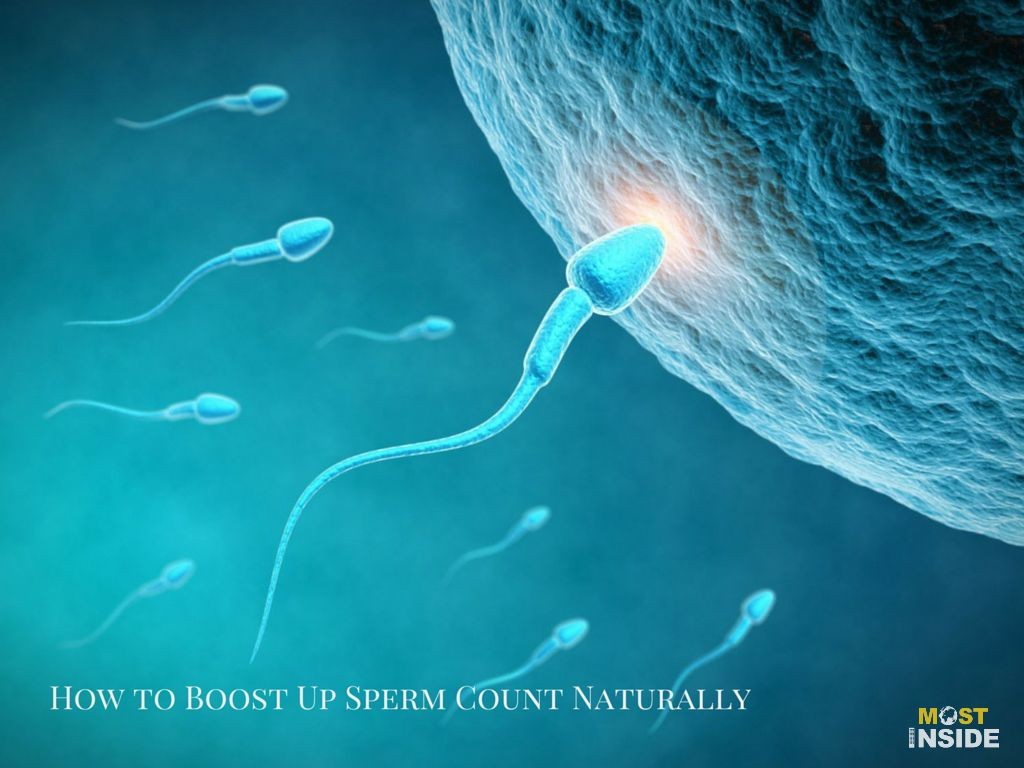How to Boost Up Sperm Count Naturally
This post was last updated on July 7th, 2023

In India, about 15% of couples experience infertility problems, and this percentage is hiking gradually. Infertility is the deprivation of conception post one year of regular copulation without the use of any contraceptive. And men are responsible for this issue at least 40% of the time. Where latest contemporary medicines and treatment has developed its own technical solutions for helping infertile couples in planning for kids, there are some natural ways to improve fertility too. Most men who are suffering from poor sperm quality are only due to unhealthy food habits and living habits. The average sperm count is between 120 and 350 million per cubic centimeter and the low sperm count is below 40 million per cubic centimeter. Low sperm counts or poor sperm quality may be caused due to environmental toxins such as chemicals, drugs, heavy metal exposure, radiations, cigarette smoking, excessive alcohol use, street drug use and pollution. So, here are some ways to boost up your sperm quality and sperm count.
1. Eating Healthy
Eating healthy would be first and best step to keep your sperm healthy. Avoid unhealthy and junk food as they may affect your reproductive system in the long run. And this is one of the reasons why maximum men are reportedly suffering from erectile dysfunction and infertility. A healthy diet which is enriched in protein, fruits, vegetables and fibrous food will help you to boost up your sperm quality. Better opt for more protein, vegetables, whole grains, less fatty foods. Peanuts, walnuts, cashews and pumpkin seeds are good for increasing sperm count.
2. Avoid or minimize alcohol
According to the research heavy alcohol consumption can lead to infertility in men. It has been studied that having more than one drink every day can lower the secretion of testosterone, which is the male reproductive hormone needed for healthy sperm production, and increased sex desire or libido. Another study revealed that 5 units of alcohol can lead to changes in levels of reproductive hormones and demean the sperm quality in young men. Not only this, alcohol can also change the structure of your sperms making them immotile.
3. Reduce caffeine intake
If you are a coffee lover or rely on coffee for your work productivity, then you need to reduce your coffee intake. Drinking too much coffee can distinctly affect a man’s fertility reducing the sperm count. According to the research, men who have had two or more cups of strong coffee a day had just a one in five chance of becoming fathers as per IVF, but for those who have had less than a cup, the chance of having a child hiked to nearly 52%. The researcher of Boston, believe that caffeine could harm sperm at a molecular level. Even a shot of espresso contains around 100mg of caffeine and men who intake 265 mg or more, have the least chance of becoming fathers. So, next time think a better place, rather opting for a coffee shop.
4. Forget about tobacco
If you are a chain smoker, you must have to quit smoking for your sperm’s sake. Cigarette smoke contains carcinogens like cadmium, lead and benzo-a-pyrene and smoking one pack of cigarettes can remarkably escalate the level of cadmium in your semen, lowering the zinc levels. Cadmium causes damage to DNA of your sperms, killing them and reducing them in number.
5. Exercise
I must say, exercise can heal 95% of your health issues. Your sperm quality is gonna degrade with your age. But keeping yourself active when you’re young, you are not gonna face too many problems in your sex life later or future. Being too skinny and too fat, both can significantly lower the levels of testosterone, and you will lose interest in sex and cause poor erections too. So, regular exercise and workouts to gain muscles and losing some weight could help you really. And remember, too much of exercising can also affect your fertility adversely so try to keep it moderate.
Read: Ways to Seduce Your Wife Every Day
6. Recreational drugs are no good
Recreational drugs like marijuana and cocaine have been are not only considered as bad addiction but also associated with the inability to perform sexually, leading to infertility or low sperm count. It can lower drastically your seminal fluid production by lowering blood supply to the penis causing poor sperm quality and lowered sperm count. So, these street drugs are no good for you, better that you stay away from them.
7. Reduce stress
A healthy mind gives you a healthy body. If your mind will be occupied with stress and worries, all the functions of your body will get affected adversely and so will your sexual organs. Higher level of stress hormones in your blood can lower sperm count, affect sperm production and can also affect your sperm quality. Yoga could also help you to improve your sperm quality.
8. Have safe sex
Involving in unsafe sex maximizes the chances of sexually transmitted diseases (STDs) and STDs which directly affect sperm production motility. This is because the pathogens which are sexually transmitted can enter the testis and affect spermatogenesis. Sometimes, the toxins generated by these pathogens can directly affect the DNA of sperm.
9. Ejaculate less frequent
Masturbation or frequent sex can lower your sperm count. Your body generates millions of sperm every single day, but if you already have low sperm count then masturbate less often and have sex less frequently keep a longer distance between your ejaculations.
10. Don’t overheat your testicles
Recent studies have found that increased exposure to heat could lower your sperm count. Avoid hot showers, using laptops on lap, regular cycling, don’t wear tight pants, wear lose cotton boxers, if you want to improve your sperm quality. Keep your testicles a bit cooler which is good for your sperm health.
Recommended For You
The Amazing Benefits of Orbitrek
Priyadarshini Muduli
A full time passionate writer with imperishable determination to bring healthy, smart and pragmatic changes individually and socially. Concentrate especially on lifestyle, life and personal improvement, relationships, mental health and behavior, viral issues and literature based subjects.




